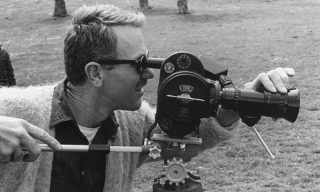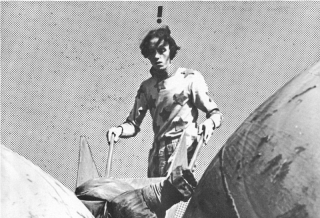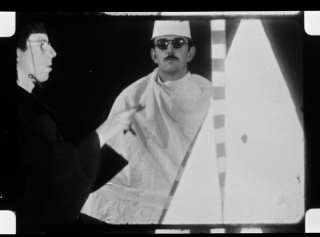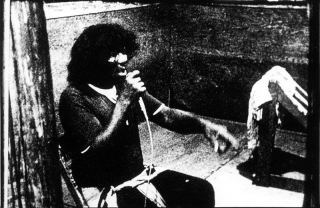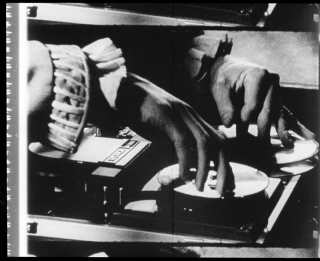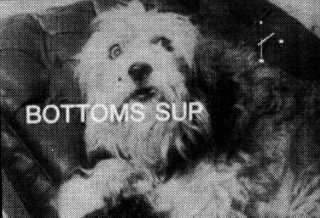Date: 5 May 2006 | Season: Robert Nelson
ROBERT NELSON: RAN WITH THE MOVIE CAMERA
5—9 May 2006
International Short Film Festival Oberhausen
Born in San Francisco, 1930. Graduated from San Francisco State College and studied at California School of Fine Arts and Mills College. Taught at San Francisco Art Institute (1965-69), CalArts (1971-73) and University of Wisconsin-Milwaukee (1978-94). Trained as a painter affiliated to the San Francisco funk art movement and began making films in 1961. An intensely productively period from 1965-67 resulted in 16 films including Oh Dem Watermelons (1965) and The Great Blondino (1967, with William T. Wiley). Nelson’s films have won prizes at Chicago (1965), Oberhausen (1966), Knokke-Le-Zoute (1967) and Ann Arbor (1998), and are in collections worldwide including the Smithsonian Institute, MoMA, National Library of Australia and Centre Pompidou. Withdrew all titles from distribution in the 1990s and began to re-edit several early films. In 2002, Robert Nelson was awarded the Phelan Art Award in Film for his works, many of which are being preserved by the Academy Film Archive. This is his first ever retrospective in Europe.
PROGRAMME NOTES
ROBERT NELSON: RAN WITH THE MOVIE CAMERA
5—9 May 2006
International Short Film Festival Oberhausen
Oberhausen 2006: For this special occasion only I have borrowed (appropriated), and personalized with my own initials, the title of an 80 year old silent film masterpiece by Dziga Vertov. When I first saw Man With The Movie Camera, I hadn’t yet dreamed of becoming a filmmaker. It was just a movie that treated my eyes and made me want more. Eye-candy with nourishment. Almost like being able to see music. It made a deep impression. Inspiration not named as such at the time; inspiration in retrospect.
No Method
It shows what can’t be seen
It sounds what can’t be heard
No art
No beauty s
No language of literature
No language of theater
No documentation
No narrative
No story
No message
No script
Step aside
the movie makes itself
“no method” can’t be taught
only discovered
if you’re lucky
and if you’ve paid the price
like ol’ D.V.
Blindfolded in the dark
He hits the nail on the head
Easy*
no problem.
Improv start to finish
not a note missed
—RAN
(the “A” stands for Andrew)
Oberhausen 2006
*“The Creative is always strong, decided, real, hence it meets with no difficulties. It always remains true to itself; hence its effortlessness. [It] shows to men the easy.”
I Ching Wilhelm/Baynes edition
Robert Nelson filmography
1961 Building Muir Beach House (with Gunvor Nelson)
1962 Last Week at Oona’s Bath (with Gunvor Nelson)
The Mystery of Amelia Air-Heart Solved!
1963 Plastic Haircut (with Ron Davis, Robert Hudson, William T. Wiley & Steve Reich, re-edit 1999 & 2003)
King Ubu (lost)
1965 Oh Dem Watermelons
Sixty Lazy Dogs (re-edit 1999, destroyed 2001)
Confessions of a Black Mother-Succuba
The Population Explosion Motorcycle Horse (audiotape)
Thick Pucker (re-edit 1999, destroyed 2002)
1966 Oily Peloso the Pumph Man (re-edit 1999)
1967 Grateful Dead (alternate version 1975)
Hot Leatherette
The Great Blondino (with William T. Wiley)
The Great Blondino Preview (with William T. Wiley)
The Off-Handed Jape (with William T. Wiley)
Penny Bright and Jimmy Witherspoon (re-edit 1999)
Half-Open and Lumpy (re-edit 1999)
Superspread (re-edit 1999, destroyed 2000)
The Awful Backlash (with William Allan)
Portrait of Gourley (re-edit 1999)
1968 The Beard
War is Hell (with William Allan)
1969 What Do You Talk About ? (videotape, two versions)
1970 Bleu Shut
R.I.P. (re-edit as Rest in Pieces, 1974 & 2003)
King David (with Mike Henderson, re-edit 2003)
1971 No-More (re-edit as More, 2000)
1973 Worldly Woman (with Mike Henderson, new soundtrack 2003)
1974 Deep Westurn (with William Geis, Mike Henderson & William T. Wiley)
1976 Special Warning (re-edit 1999)
Suite California Stops and Passes: Part 1 (re-edit 2003)
1978 Suite California Stops and Passes: Part 2
Castiac Junction (aka Interesting Cities and Towns)
1979 How To Get Out of a Burning House
1982 Hamlet Act
1986 He Sees Blind Horses and Bad Poetry (destroyed 1999)
1985 Tiger Stymie (re-edit as Curious Native Customs, 1999)
1988 Limitations
1989 199 L. la (videotape)
1997 Hauling Toto Big
Back to top
Date: 5 May 2006 | Season: Robert Nelson
ROBERT NELSON: RAN WITH THE MOVIE CAMERA 1
Friday 5 May 2006, at 5pm
International Short Film Festival Oberhausen
Robert Nelson, Confessions of a Black Mother-Succuba, USA, 1965, 16mm, 16 min
Preserved by the Academy Film Archive
Nelson concocted this wild collage film from a mix of staged absurdist erotica and bizarre found footage. He uses (and subverts) all the obscenity, shallowness, and unsubtle coercion of American media and advertising to create a raucous, satirical come-on. (MT)
Robert Nelson, The Awful Backlash, USA, 1967, 16mm, 15 min
Preserved by the Academy Film Archive
The Awful Backlash focuses “solely on a pair of hands as they begin to unravel what appears to be a tangled fishing line. Any further evidence of the title’s confusing ‘awfulness’ – other than the literal disentanglement of the line remains, however, tentative, left as it were, literally, at a loose end. The viewer knows nothing of the incident that led to this backlash or entanglement; nor of the directors’ initial motive for the title indeed not of any other attempt at blending an additional storyline beyond what is seen. There is, perhaps, one link with a reverse reaction – a sense of gradual recovery taking place, as the thread unfolds from a position of multiplicity back to a singular line.” (Pamela Kember)
Robert Nelson, Limitations, USA, 1988, 16mm, 9 min
Preserved by the Academy Film Archive
“An experiment in group portraiture in which we are simultaneously seeing opposing sides of the sitters’ heads. Probably not a solution for every group portrait, but a distinctive result has been achieved here nonetheless.” (Q.A. Standish)
Robert Nelson, The Great Blondino, USA, 1967, 16mm, 43 min
Preserved by Pacific Film Archive with the cooperation of Robert Nelson and the support of the Academy Film Archive, the William H. Donner Foundation and the National Endowment for the Arts
The Great Blondino follows an anachronistically attired young fellow as he navigates a beguiling, sometimes troubling world with a curiosity that opens us wide to the filmmakers’ inspired, freeform vision. Blondino was created with no pressure or expectations, and came together in coherent form only as Nelson began to weave it together during the editing process. The result is a film which feels utterly exuberant and freed from rote cinematic restriction, yet embodies an artistic rigor and direction that prevents it from ever seeming too unhinged. An incredible feat of tightrope walking. (MT)
Date: 5 May 2006 | Season: Robert Nelson
ROBERT NELSON: RAN WITH THE MOVIE CAMERA 2
Friday 5 May 2006, at 10:30pm
International Short Film Festival Oberhausen
Robert Nelson, Plastic Haircut, USA, 1963, 16mm, 16 min
Preserved by Pacific Film Archive with the cooperation of Robert Nelson and the support of the William H. Donner Foundation and the National Endowment for the Arts
Dada-inspired performance in which absurd actions take place in an environment of strange symbols and graphic forms. (MW)
“None of us knew anything about making movies at that time, but we all knew about art (namely, that it had something to do with having a good time).” (RAN)
Robert Nelson, The Off-Handed Jape, USA, 1967, 16mm, 9 min
Preserved by the Academy Film Archive
A humorous lesson in gestural acting from Dr. Otis Bird and Butch Babad, demonstrating such useful phrases as “the verge of remembering” and “letting your friend know he’s forgotten to zip up his pants.” (MW)
“This film can be of immeasurable aid to would-be actors who are weak in the jape.” (William T. Wiley)
Robert Nelson, Hot Leatherette, USA, 1967, 16mm, 5 min
Preserved by the Academy Film Archive
“A kinetic film sketch designed to involve the viewers’ muscles. The rocky seaside cliffs near Stinson Beach, California, hold the wrecked carcass of a ’52 pickup that is a rusting monument to Hot Leatherette.” (RAN)
Robert Nelson, Grateful Dead, USA, 1967, 16mm, 9 min
Footage of the Grateful Dead is treated, re-filmed and cut together to a tape collage of tracks from their first album. (MW)
“The film is full of beautiful invention and works as a visual equivalent of their musical impressions. The cuts and loops, blurring polarisations, chopped up and speeded up action all serve to render the West Coast rock group as if they were animated cartoon characters.” (Variety)
Robert Nelson, Bleu Shut, USA, 1970, 16mm, 33 min
“Even when we know the game is an illusion, the experience of Bleu Shut is entirely a pleasure: the ‘game’ is fun; the Nelson/Wiley debates, infectiously funny; and Nelson’s choice of imagery, quirky and amusing. Bleu Shut reveals, and allows us to enjoy, our gullibility within the pervasive absurdity of modern life.” (Scott MacDonald)
Date: 6 May 2006 | Season: Robert Nelson
ROBERT NELSON: RAN WITH THE MOVIE CAMERA 3
Saturday 6 May 2006, at 7pm
International Short Film Festival Oberhausen
Robert Nelson, Deep Westurn, USA, 1974, 16mm, 6 min
Preserved by the Academy Film Archive
A ‘film wake’ for a friend who gave free dental care in exchange for artwork. (MW)
“Though celebratory in mood, it has a mournful subtext … death and dying. We dedicated it to Dr. Sam West, departed friend and patron of the arts, trusting that his ghost would approve our hijinx and seeming irreverence.” (RAN)
Robert Nelson, Special Warning, USA, 1974/1999, 16mm, 8 min
“Special Warning is like a poem more than a narrative or story. It suggests states of isolation, barrenness, sexual guilt and sin, but even these punishing afflictions can have a humorous aspect when accompanied by horns.” (RAN)
Robert Nelson, More, USA, 1971/2000, 16mm, 20 min
Two complete sections from the 70-minute film No-More which Nelson produced with students at a summer school in Ithaca, NY. Shot in a verité style, they show a baseball game between hippies and straights, and the stoned and drunken party that follows as the kids hit the streets that evening. (MW)
Robert Nelson, Hauling Toto Big, USA, 1997, 16mm, 43 min
“Hauling Toto Big operates on so many levels and points to so many different traditions of the avant-garde that it could serve as a compendium of style and theme, while also bearing Nelson’s particular stamp and trickster persona. It’s too bad his work is so rarely seen – it’s some of the most irreverent, unpretentious, and loving work I’ve ever laid eyes on.” (Michael Joshua Rowin)
“This is my best film. This one cuts the deepest. Upon this one I stand or fall. Better yet the larger one comprised of all.” (RAN)
Date: 8 May 2006 | Season: Robert Nelson
ROBERT NELSON: RAN WITH THE MOVIE CAMERA 4
Monday 8 May 2006, at 8pm
International Short Film Festival Oberhausen
Robert Nelson, King David, USA, 1970/2002, 16mm, 9 min
Preserved by the Academy Film Archive
Whilst filming in a San Francisco park, Nelson and Henderson met street prophet ‘King David’, who proceeds to communicate some of his beliefs about life and religious mythology. (MW)
Robert Nelson, Hamlet Act, USA, 1982, 16mm, 22 min
“Hamlet Act demonstrates what can be done when a film text is made to oppose a theatrical text, creating a new synthesis. The dialectic oppositions set up between film/video, film/theatre, video/theatre, and film/video/theatre create a total transformation of Hamlet from its pre-20th century signification system to a contemporary signification system. Hamlet, caught in the web of psychological forces is seen, through his position between film/video/theatre, as a metaphor for contemporary technology.” (Owen Shapiro)
Robert Nelson, Suite California Stops and Passes: Part I, USA, 1976/2003, 16mm, 35 min
“A funky odyssey into both Nelson’s personal history and that of his state. It has a quality of playfulness as Nelson experiments with varying juxtapositions of sounds and images. It is a carefully structured, painstaking work of much beauty and emotional impact that reaffirms Robert Nelson’s gifts as a very personal, very venturesome filmmaker.” (Kevin Thomas)
Date: 9 May 2006 | Season: Robert Nelson
ROBERT NELSON: RAN WITH THE MOVIE CAMERA 5
Tuesday 9 May 2006, at 12:30pm
International Short Film Festival Oberhausen
Robert Nelson, Worldly Woman, USA, 1973, 16mm, 7 min
A sort of revolutionary triptych. A devotional painting to all things that spin. (MT)
Robert Nelson, Curious Native Customs, USA, 1985/1999, 16mm, 8 min
A mind-boggling mixture of found, educational and outtake footage which seems to contain the precious residue of years of filmmaking. (MW)
“It was like my muse had fainted … but I didn’t care. Why make a film? Why not? I didn’t care. The only dim curiosity was wondering what such a careless work would look like? Funky. Looks like a beatnik work.” (RAN)
Robert Nelson, Rest In Pieces, USA, 1970-74/2003, 16mm, 8 min
“For several years, Paul Marioni earned his living straightening bent automobile frames. In 1970, in a departing-the-trade ceremony, he used his tools to break an automobile in two. I thought that the ceremony would be interesting and I wanted to film it. (He was going to do it even if no one came.) The moment that the car bursts is over so quickly that it’s a bit anti-climactic and so I wanted to put something ‘meditative’ with it … That is, to make a poem out of it.” (RAN)
Robert Nelson, Oh Dem Watermelons, USA, 1965, 16mm, 11 min
Made for the Mime Troupe’s performance “A Minstrel Show (or Civil Rights in a Cracker Barrel)”, the film challenges racism by presenting absurdly exaggerated stereotypes. The hapless fruits are mindlessly pulped, before turning on their aggressors. Now, follow the bouncing watermelon … (MW)
“Original idea and inspiration from La Course aux Potirons (1907) by Louis Feuillade.” (RAN)
Robert Nelson, 199 L. la, USA, 1989, video, 35 min
Wiley & Henderson are seen playing songs in a studio as the tape meanders around their immediate environment, playing with the viewer via a series of musical and visual jokes. One of Nelson’s few video works, this piece is another demonstration of the camaraderie between long-term friends and collaborators. (MW)
